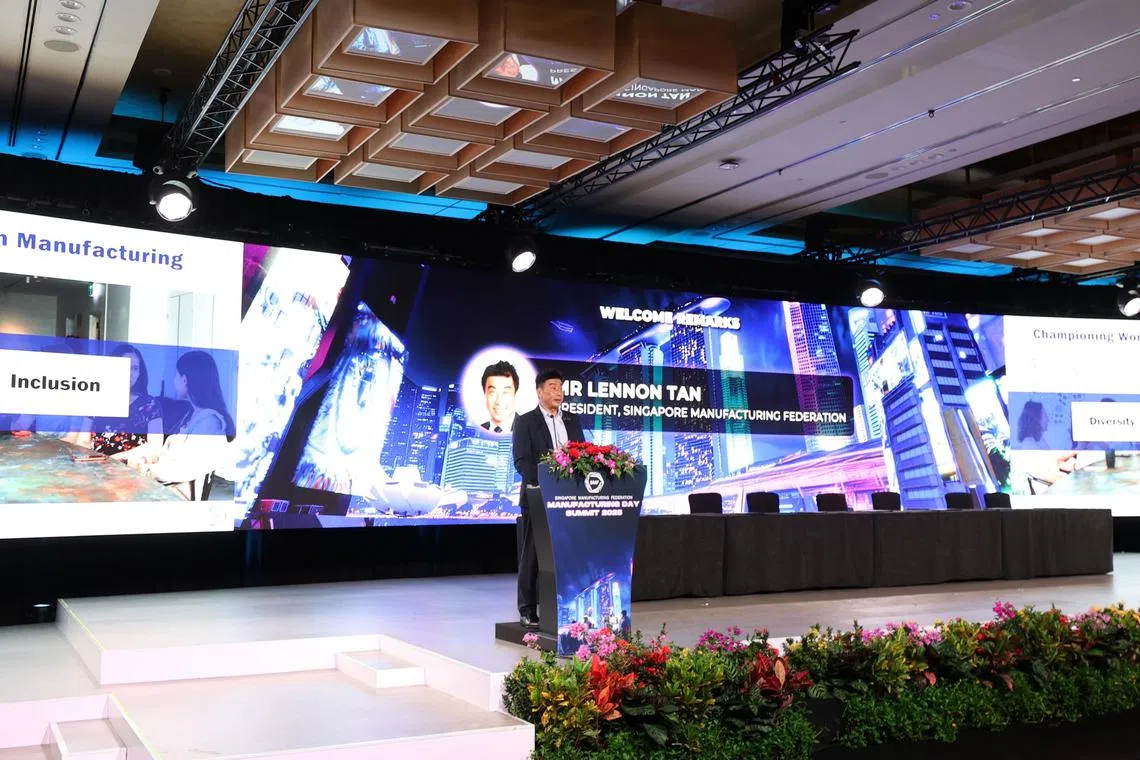AI and workers together can enhance Singapore as global manufacturing hub
Sign up now: Get ST's newsletters delivered to your inbox

SMF president Lennon Tan speaking during Singapore Manufacturing Federation’s annual conference on Jan 17.
PHOTO: SINGAPORE MANUFACTURING FEDERATION
SINGAPORE – Singapore must strike a balance between integrating artificial intelligence (AI) and fully harnessing the potential of its workforce to enhance its position as a global hub for advanced manufacturing and drive growth, noted Minister of State for Trade and Industry Alvin Tan.
Mr Tan, who is also the Minister of State for Culture, Community and Youth, told Singapore Manufacturing Federation’s (SMF) annual conference on Jan 17: “Beyond the mechanical precision and automation of smart machines, it is the distinctly human abilities – creativity, problem-solving, adaptive reasoning – that form the backbone of an innovative and thriving manufacturing sector.
“These very quintessential human abilities cannot be replaced by AI.”
Rather than being replaced by automation, workers can, and have indeed, become valued partners in the manufacturing process.
Mr Tan urged an audience of 1,500 industry participants to envision a future of manufacturing driven by humans and machines working together.
Humans are able to focus on cognitive work such as product design and customisation, as well as supervising AI-powered robots that help with product assembly and other physically demanding tasks like loading and unloading heavy equipment and parts.
For that to happen, good people will be needed, and companies will have to invest in training and reskilling programmes, Mr Tan said.
He added that the increasing use of technology should also generate higher value jobs, making manufacturing work more attractive and exciting, especially for fresh graduates. Technology can also relieve the physical strain for older workers and help them stay productive for longer.
Meanwhile, greater effort is being made to enhance the appeal of manufacturing to female workers, Mr Tan said.
SMF president Lennon Tan noted on the sidelines of the conference that while the outlook for the production of goods like semiconductors and advanced electronics is improving, growth will not be felt in all areas of manufacturing.
He said small and medium-sized enterprises (SMEs) that are not involved in advanced manufacturing will continue to feel cost pressures and face other uncertainties that will hinder new investments and growth.
“SMF will help these SMEs navigate such challenges and prioritise upskilling the workforce through better adoption of AI,” Mr Tan added.
He noted that these efforts are needed to ensure that manufacturing as a whole remains robust and that the workforce can meet the demands of the industry.
The conference also saw the launch of a new MNC-SME Alliance which aims to bring together multinational corporations, local SMEs and crucial ecosystem partners to foster collaborations that generate real value.
One example is the partnership between Lenovo Singapore and ST Logistics, announced on Jan 17, where Lenovo’s AI robots will be used to automate the logistics processes at ST Logistics’ warehouses to accelerate the flow of goods and order processing and ensure customer orders are fulfilled on time.
Such moves are also aligned with a national goal of raising the manufacturing sector’s value-add by 50 per cent by 2030, said SMF’s Mr Tan.
The sector is the second-largest contributor to Singapore’s gross domestic product at 20 per cent, and employs about 12 per cent of the local workforce.


